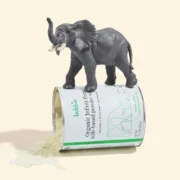Houseplant delivery startups have soared and evolved to offer related services like smart plant meters and GM plants to purify indoor air.
7 out of 10 millennials call themselves a ‘Plant Parent’, latest research shows. This basically means it’s not limited to a mere hobby anymore among them. Cultivating an indoor succulent plant is indeed a good boost to well being and mental health. Mengmeng Gu, assistant professor of Horticulture sciences at Texas A & M University says,“Different properties of plants, such as how they look, smell and feel, impact us in so many ways.” to The Washington Post.
But wait, how green are your plants?
Peat is a soil-like substance formed from decayed organic matter in which the majority of houseplants are grown, says The Telegraph. Mining peat “is now widely condemned as unsustainable, environment-wrecking and carbon-emitting”, further the paper continues.
Peatlands are highly carbon absorbing and store huge amounts of carbon dioxide (CO2) from the atmosphere. So when peat is harvested, CO2 is released and as a result, greenhouse gas levels increase. Peat is a finite resource that can take thousands of years to form as well. Botanist, Dr Trevor Dines told the BBC, “Commercial extraction can remove over 500 years-worth of growth in a single year,”
Plant Miles cause a significant environmental footprint, which is the other big problem with indoor plants. Plant Miles means the transportation or the shipping distance covered if a houseplant is ordered online from abroad. “As many plants are brought in from overseas, their transportation represents a significant ecological footprint.”, Fay Kenworthy, co-founder of PlantSwap told the magazine. The company highly encourages people to buy plants locally through its initiative.
Kenworthy further says,”You may have decided to reduce your international travel to protect the environment but your plants are still shipping across the world.”
However, Botanist James Wong, the proud owner of 500 plants doesn’t consider it as much of a concern. According to Wong, the quantity is going to be less so by definition itself, it clearly is a case of lower carbon footprint.
“If you are driving to your garden center to buy houseplants, the emissions from your car will almost certainly be greater than the emissions generated in getting it from grower to garden center.”, wrote Wong at The Guardian.
But what about the Plastic Pots that come with new plants? Amy Week, an anti plastic campaigner says Pots can be a ‘nightmare’ to recycle. Week encourages people to think to themselves, “Will I be able to use it again, or is there somewhere else I could look to buy these plants that are using more sustainable packaging or one that could be used for longer?” (via BBC)
Are houseplants really filtering the air?
NASA way back in 1989 reported that houseplants could remove cancer causing chemicals from homes. However, the latest research by Michael Waring, PhD , an Assistant professor of Architecture and Environmental Engineering in Drexel University shows that there is a ‘common misconception’ about indoor plants improving air quality.
“Plants are great, but they don’t actually clean indoor air quickly enough to have an effect on the air quality of your home or office environment,” said Waring.
The experiment by NASA was conducted in a sealed chamber tracking its decay over hours and days. This time, Waring took one step farther and used ‘clean air delivery rate’ or ‘CADR’.
The study concludes that,‘The rate at which plants dissipated VOCs in a chamber was orders of magnitude slower than the standard rate of air exchange in a building — thus proving the plants’ overall effect on indoor air quality to be irrelevant.’
So the claims about the ability to improve the air seems overrated.
The answer to whether indoor plants are really good for the environment is not black or white. Because it ultimately depends upon an individual’s habit and practice. As a hobby, it definitely stimulates the mind and body. So both indoor and outdoor, gardening can provide multiple benefits. Measuring cost and also supporting environmental protection is a little challenge and can be solved if more dedication is put into sustainable methods by the plant industry.













